Impact of Globalisation on Marketing: Honda Ltd Case Study
VerifiedAdded on 2021/01/01
|32
|8136
|144
Report
AI Summary
This business research project investigates the multifaceted impact of globalization on Honda Ltd's marketing strategies. The report begins with an introduction outlining the positive, economic, cultural, and ethical dimensions of globalization's influence on business, particularly within the motorcar industry. It provides a company overview of Honda Ltd. The research aims to explore the economic, cultural, and ethical benefits of globalization on Honda Ltd's marketing. The study employs a literature review to contextualize the research, examining the impact of globalization on the motorcar industry and its economic, cultural, and ethical benefits. The methodology section describes the research approach and methods used for data collection and analysis. The report then presents findings derived from primary and secondary data. A personal reflective statement is included, discussing the research methods and areas for further investigation. The conclusion summarizes the key findings and provides recommendations for Honda Ltd's future marketing strategies. Finally, references are provided to support the research.

BUSINESS RESEARCH
PROJECT
PROJECT
Paraphrase This Document
Need a fresh take? Get an instant paraphrase of this document with our AI Paraphraser
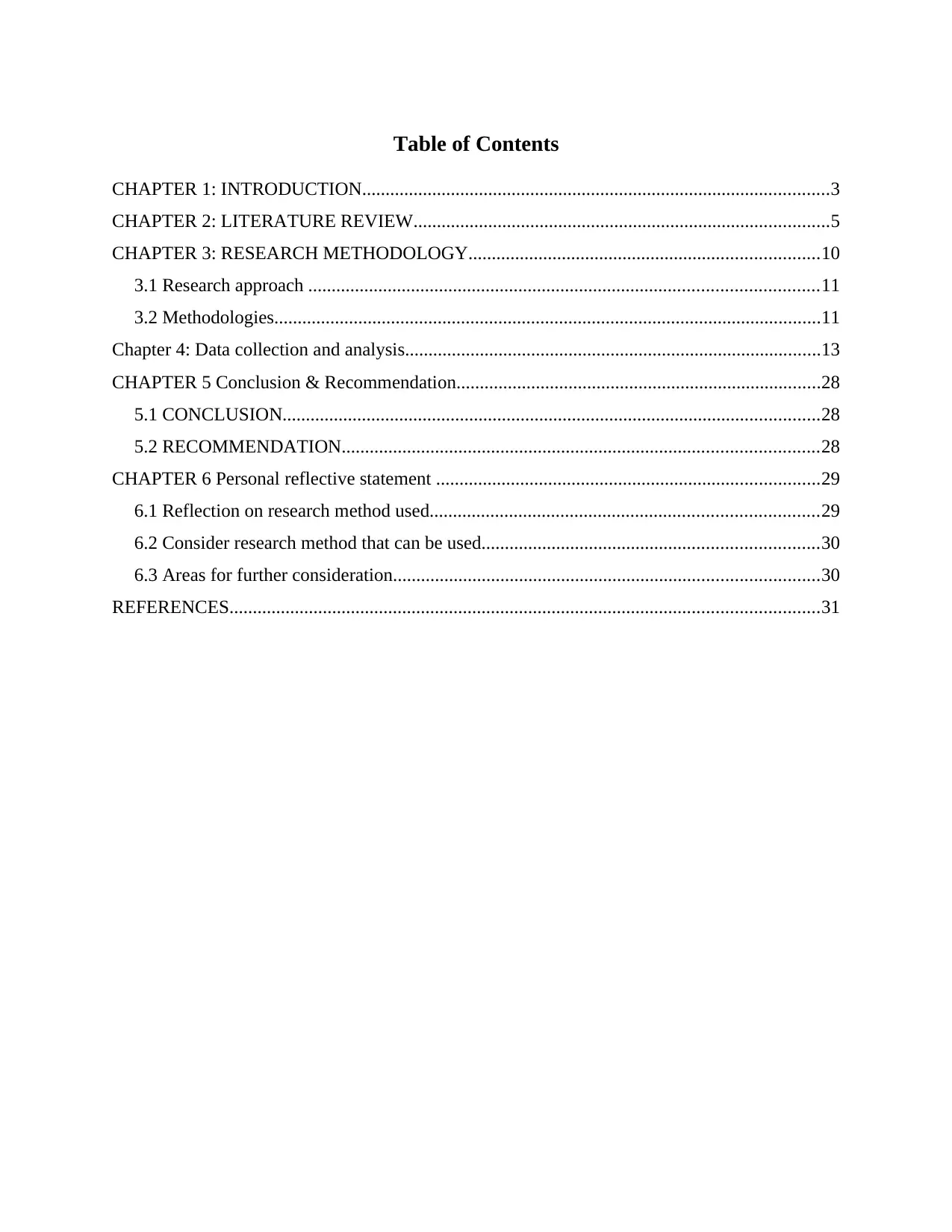
Table of Contents
CHAPTER 1: INTRODUCTION....................................................................................................3
CHAPTER 2: LITERATURE REVIEW.........................................................................................5
CHAPTER 3: RESEARCH METHODOLOGY...........................................................................10
3.1 Research approach .............................................................................................................11
3.2 Methodologies.....................................................................................................................11
Chapter 4: Data collection and analysis.........................................................................................13
CHAPTER 5 Conclusion & Recommendation..............................................................................28
5.1 CONCLUSION...................................................................................................................28
5.2 RECOMMENDATION......................................................................................................28
CHAPTER 6 Personal reflective statement ..................................................................................29
6.1 Reflection on research method used...................................................................................29
6.2 Consider research method that can be used........................................................................30
6.3 Areas for further consideration...........................................................................................30
REFERENCES..............................................................................................................................31
CHAPTER 1: INTRODUCTION....................................................................................................3
CHAPTER 2: LITERATURE REVIEW.........................................................................................5
CHAPTER 3: RESEARCH METHODOLOGY...........................................................................10
3.1 Research approach .............................................................................................................11
3.2 Methodologies.....................................................................................................................11
Chapter 4: Data collection and analysis.........................................................................................13
CHAPTER 5 Conclusion & Recommendation..............................................................................28
5.1 CONCLUSION...................................................................................................................28
5.2 RECOMMENDATION......................................................................................................28
CHAPTER 6 Personal reflective statement ..................................................................................29
6.1 Reflection on research method used...................................................................................29
6.2 Consider research method that can be used........................................................................30
6.3 Areas for further consideration...........................................................................................30
REFERENCES..............................................................................................................................31
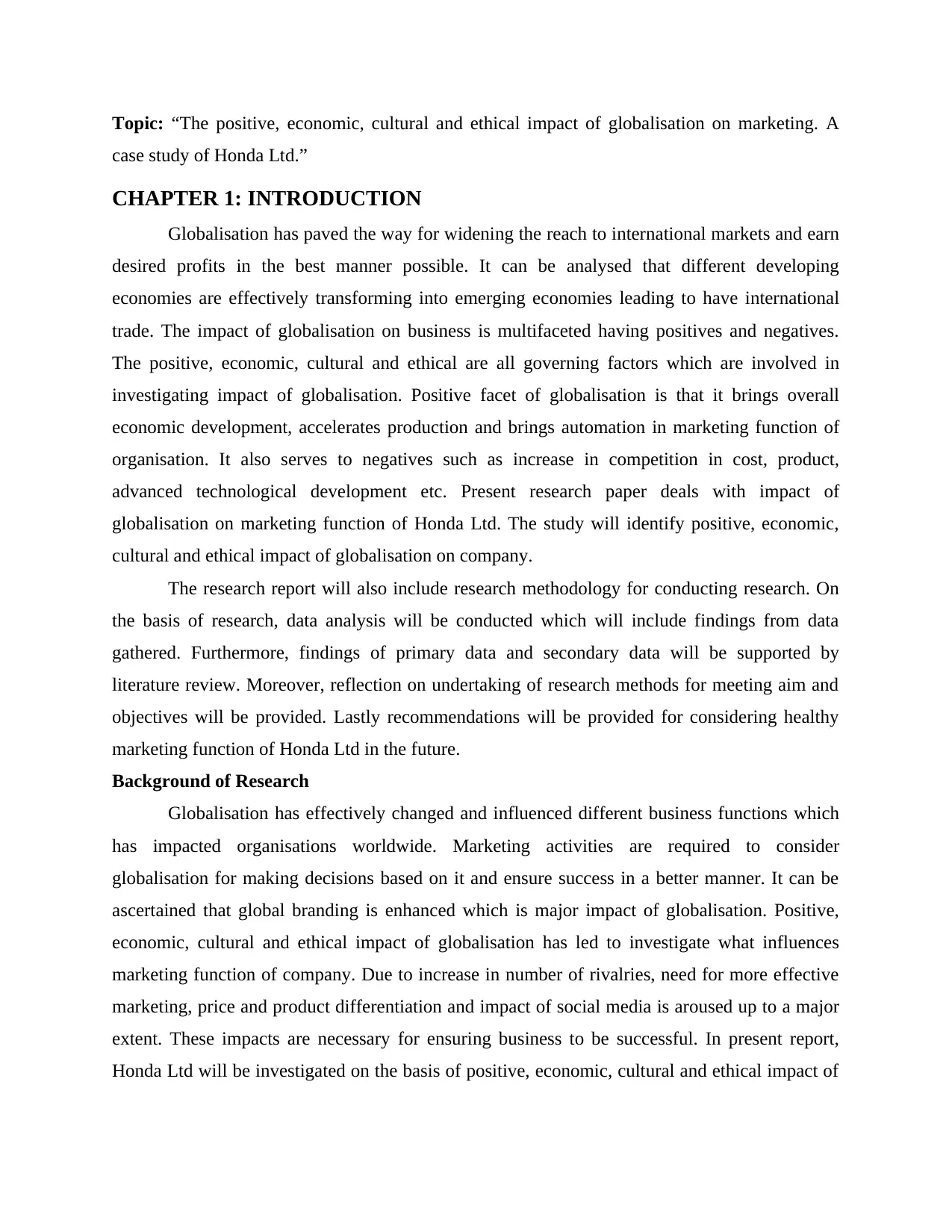
Topic: “The positive, economic, cultural and ethical impact of globalisation on marketing. A
case study of Honda Ltd.”
CHAPTER 1: INTRODUCTION
Globalisation has paved the way for widening the reach to international markets and earn
desired profits in the best manner possible. It can be analysed that different developing
economies are effectively transforming into emerging economies leading to have international
trade. The impact of globalisation on business is multifaceted having positives and negatives.
The positive, economic, cultural and ethical are all governing factors which are involved in
investigating impact of globalisation. Positive facet of globalisation is that it brings overall
economic development, accelerates production and brings automation in marketing function of
organisation. It also serves to negatives such as increase in competition in cost, product,
advanced technological development etc. Present research paper deals with impact of
globalisation on marketing function of Honda Ltd. The study will identify positive, economic,
cultural and ethical impact of globalisation on company.
The research report will also include research methodology for conducting research. On
the basis of research, data analysis will be conducted which will include findings from data
gathered. Furthermore, findings of primary data and secondary data will be supported by
literature review. Moreover, reflection on undertaking of research methods for meeting aim and
objectives will be provided. Lastly recommendations will be provided for considering healthy
marketing function of Honda Ltd in the future.
Background of Research
Globalisation has effectively changed and influenced different business functions which
has impacted organisations worldwide. Marketing activities are required to consider
globalisation for making decisions based on it and ensure success in a better manner. It can be
ascertained that global branding is enhanced which is major impact of globalisation. Positive,
economic, cultural and ethical impact of globalisation has led to investigate what influences
marketing function of company. Due to increase in number of rivalries, need for more effective
marketing, price and product differentiation and impact of social media is aroused up to a major
extent. These impacts are necessary for ensuring business to be successful. In present report,
Honda Ltd will be investigated on the basis of positive, economic, cultural and ethical impact of
case study of Honda Ltd.”
CHAPTER 1: INTRODUCTION
Globalisation has paved the way for widening the reach to international markets and earn
desired profits in the best manner possible. It can be analysed that different developing
economies are effectively transforming into emerging economies leading to have international
trade. The impact of globalisation on business is multifaceted having positives and negatives.
The positive, economic, cultural and ethical are all governing factors which are involved in
investigating impact of globalisation. Positive facet of globalisation is that it brings overall
economic development, accelerates production and brings automation in marketing function of
organisation. It also serves to negatives such as increase in competition in cost, product,
advanced technological development etc. Present research paper deals with impact of
globalisation on marketing function of Honda Ltd. The study will identify positive, economic,
cultural and ethical impact of globalisation on company.
The research report will also include research methodology for conducting research. On
the basis of research, data analysis will be conducted which will include findings from data
gathered. Furthermore, findings of primary data and secondary data will be supported by
literature review. Moreover, reflection on undertaking of research methods for meeting aim and
objectives will be provided. Lastly recommendations will be provided for considering healthy
marketing function of Honda Ltd in the future.
Background of Research
Globalisation has effectively changed and influenced different business functions which
has impacted organisations worldwide. Marketing activities are required to consider
globalisation for making decisions based on it and ensure success in a better manner. It can be
ascertained that global branding is enhanced which is major impact of globalisation. Positive,
economic, cultural and ethical impact of globalisation has led to investigate what influences
marketing function of company. Due to increase in number of rivalries, need for more effective
marketing, price and product differentiation and impact of social media is aroused up to a major
extent. These impacts are necessary for ensuring business to be successful. In present report,
Honda Ltd will be investigated on the basis of positive, economic, cultural and ethical impact of
⊘ This is a preview!⊘
Do you want full access?
Subscribe today to unlock all pages.

Trusted by 1+ million students worldwide
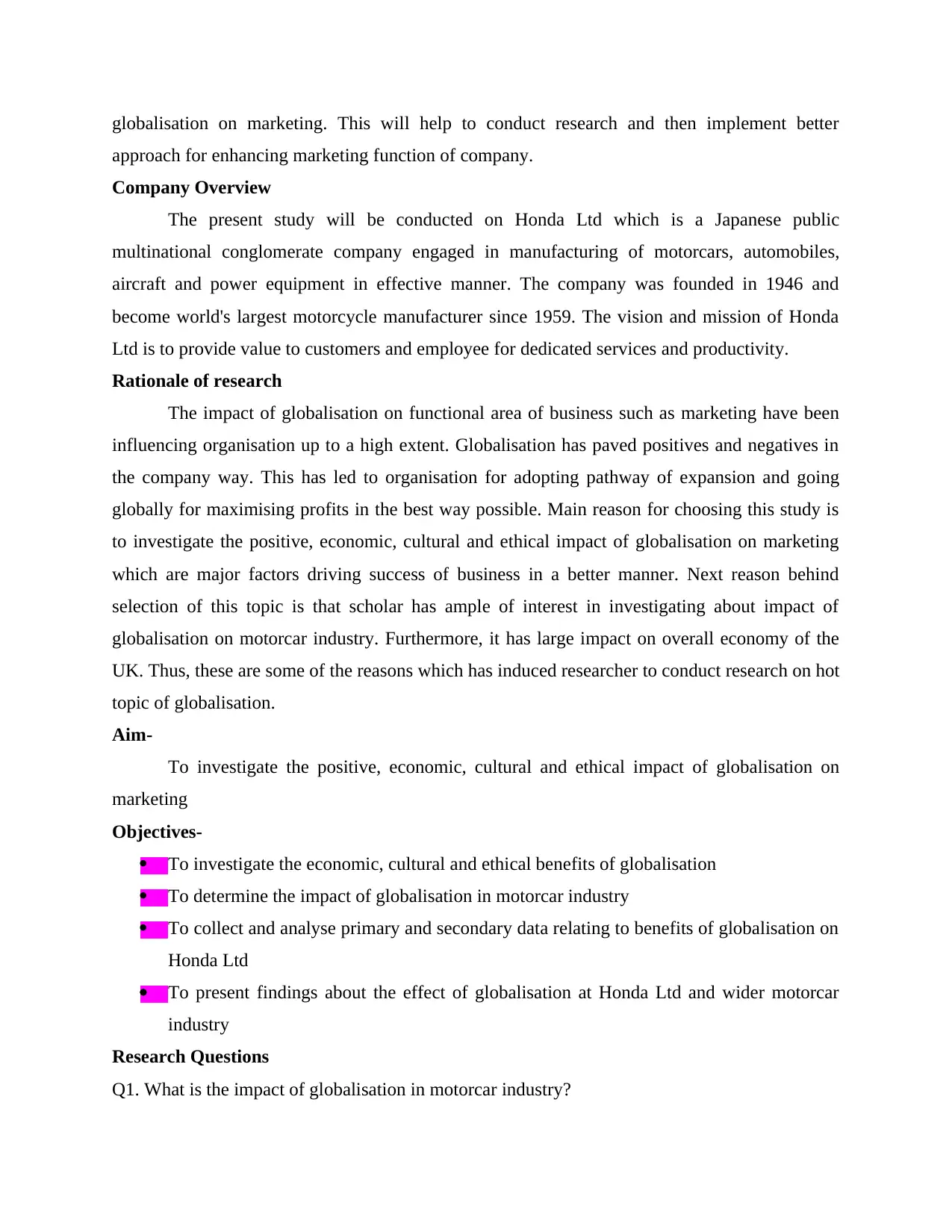
globalisation on marketing. This will help to conduct research and then implement better
approach for enhancing marketing function of company.
Company Overview
The present study will be conducted on Honda Ltd which is a Japanese public
multinational conglomerate company engaged in manufacturing of motorcars, automobiles,
aircraft and power equipment in effective manner. The company was founded in 1946 and
become world's largest motorcycle manufacturer since 1959. The vision and mission of Honda
Ltd is to provide value to customers and employee for dedicated services and productivity.
Rationale of research
The impact of globalisation on functional area of business such as marketing have been
influencing organisation up to a high extent. Globalisation has paved positives and negatives in
the company way. This has led to organisation for adopting pathway of expansion and going
globally for maximising profits in the best way possible. Main reason for choosing this study is
to investigate the positive, economic, cultural and ethical impact of globalisation on marketing
which are major factors driving success of business in a better manner. Next reason behind
selection of this topic is that scholar has ample of interest in investigating about impact of
globalisation on motorcar industry. Furthermore, it has large impact on overall economy of the
UK. Thus, these are some of the reasons which has induced researcher to conduct research on hot
topic of globalisation.
Aim-
To investigate the positive, economic, cultural and ethical impact of globalisation on
marketing
Objectives-
To investigate the economic, cultural and ethical benefits of globalisation
To determine the impact of globalisation in motorcar industry
To collect and analyse primary and secondary data relating to benefits of globalisation on
Honda Ltd
To present findings about the effect of globalisation at Honda Ltd and wider motorcar
industry
Research Questions
Q1. What is the impact of globalisation in motorcar industry?
approach for enhancing marketing function of company.
Company Overview
The present study will be conducted on Honda Ltd which is a Japanese public
multinational conglomerate company engaged in manufacturing of motorcars, automobiles,
aircraft and power equipment in effective manner. The company was founded in 1946 and
become world's largest motorcycle manufacturer since 1959. The vision and mission of Honda
Ltd is to provide value to customers and employee for dedicated services and productivity.
Rationale of research
The impact of globalisation on functional area of business such as marketing have been
influencing organisation up to a high extent. Globalisation has paved positives and negatives in
the company way. This has led to organisation for adopting pathway of expansion and going
globally for maximising profits in the best way possible. Main reason for choosing this study is
to investigate the positive, economic, cultural and ethical impact of globalisation on marketing
which are major factors driving success of business in a better manner. Next reason behind
selection of this topic is that scholar has ample of interest in investigating about impact of
globalisation on motorcar industry. Furthermore, it has large impact on overall economy of the
UK. Thus, these are some of the reasons which has induced researcher to conduct research on hot
topic of globalisation.
Aim-
To investigate the positive, economic, cultural and ethical impact of globalisation on
marketing
Objectives-
To investigate the economic, cultural and ethical benefits of globalisation
To determine the impact of globalisation in motorcar industry
To collect and analyse primary and secondary data relating to benefits of globalisation on
Honda Ltd
To present findings about the effect of globalisation at Honda Ltd and wider motorcar
industry
Research Questions
Q1. What is the impact of globalisation in motorcar industry?
Paraphrase This Document
Need a fresh take? Get an instant paraphrase of this document with our AI Paraphraser
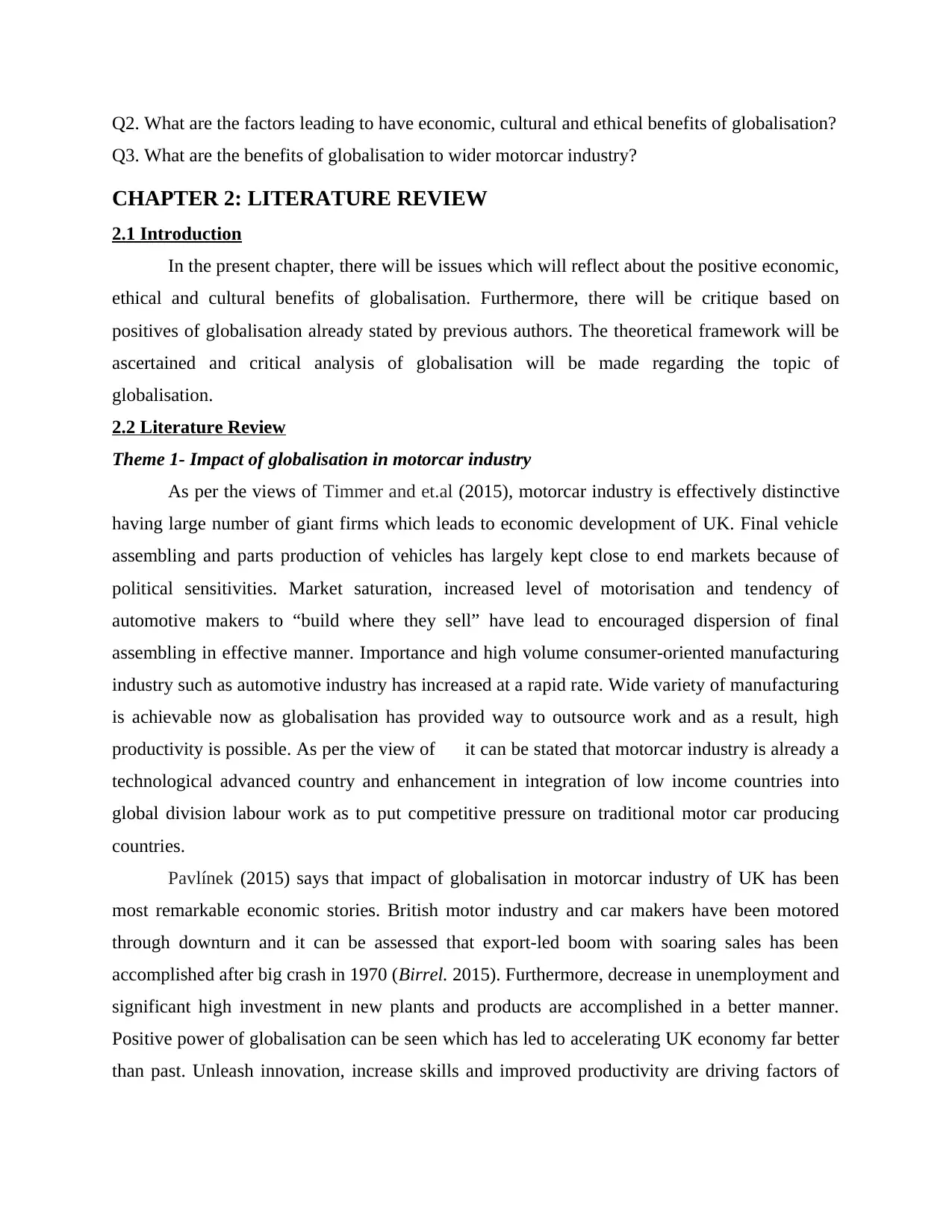
Q2. What are the factors leading to have economic, cultural and ethical benefits of globalisation?
Q3. What are the benefits of globalisation to wider motorcar industry?
CHAPTER 2: LITERATURE REVIEW
2.1 Introduction
In the present chapter, there will be issues which will reflect about the positive economic,
ethical and cultural benefits of globalisation. Furthermore, there will be critique based on
positives of globalisation already stated by previous authors. The theoretical framework will be
ascertained and critical analysis of globalisation will be made regarding the topic of
globalisation.
2.2 Literature Review
Theme 1- Impact of globalisation in motorcar industry
As per the views of Timmer and et.al (2015), motorcar industry is effectively distinctive
having large number of giant firms which leads to economic development of UK. Final vehicle
assembling and parts production of vehicles has largely kept close to end markets because of
political sensitivities. Market saturation, increased level of motorisation and tendency of
automotive makers to “build where they sell” have lead to encouraged dispersion of final
assembling in effective manner. Importance and high volume consumer-oriented manufacturing
industry such as automotive industry has increased at a rapid rate. Wide variety of manufacturing
is achievable now as globalisation has provided way to outsource work and as a result, high
productivity is possible. As per the view of it can be stated that motorcar industry is already a
technological advanced country and enhancement in integration of low income countries into
global division labour work as to put competitive pressure on traditional motor car producing
countries.
Pavlínek (2015) says that impact of globalisation in motorcar industry of UK has been
most remarkable economic stories. British motor industry and car makers have been motored
through downturn and it can be assessed that export-led boom with soaring sales has been
accomplished after big crash in 1970 (Birrel. 2015). Furthermore, decrease in unemployment and
significant high investment in new plants and products are accomplished in a better manner.
Positive power of globalisation can be seen which has led to accelerating UK economy far better
than past. Unleash innovation, increase skills and improved productivity are driving factors of
Q3. What are the benefits of globalisation to wider motorcar industry?
CHAPTER 2: LITERATURE REVIEW
2.1 Introduction
In the present chapter, there will be issues which will reflect about the positive economic,
ethical and cultural benefits of globalisation. Furthermore, there will be critique based on
positives of globalisation already stated by previous authors. The theoretical framework will be
ascertained and critical analysis of globalisation will be made regarding the topic of
globalisation.
2.2 Literature Review
Theme 1- Impact of globalisation in motorcar industry
As per the views of Timmer and et.al (2015), motorcar industry is effectively distinctive
having large number of giant firms which leads to economic development of UK. Final vehicle
assembling and parts production of vehicles has largely kept close to end markets because of
political sensitivities. Market saturation, increased level of motorisation and tendency of
automotive makers to “build where they sell” have lead to encouraged dispersion of final
assembling in effective manner. Importance and high volume consumer-oriented manufacturing
industry such as automotive industry has increased at a rapid rate. Wide variety of manufacturing
is achievable now as globalisation has provided way to outsource work and as a result, high
productivity is possible. As per the view of it can be stated that motorcar industry is already a
technological advanced country and enhancement in integration of low income countries into
global division labour work as to put competitive pressure on traditional motor car producing
countries.
Pavlínek (2015) says that impact of globalisation in motorcar industry of UK has been
most remarkable economic stories. British motor industry and car makers have been motored
through downturn and it can be assessed that export-led boom with soaring sales has been
accomplished after big crash in 1970 (Birrel. 2015). Furthermore, decrease in unemployment and
significant high investment in new plants and products are accomplished in a better manner.
Positive power of globalisation can be seen which has led to accelerating UK economy far better
than past. Unleash innovation, increase skills and improved productivity are driving factors of
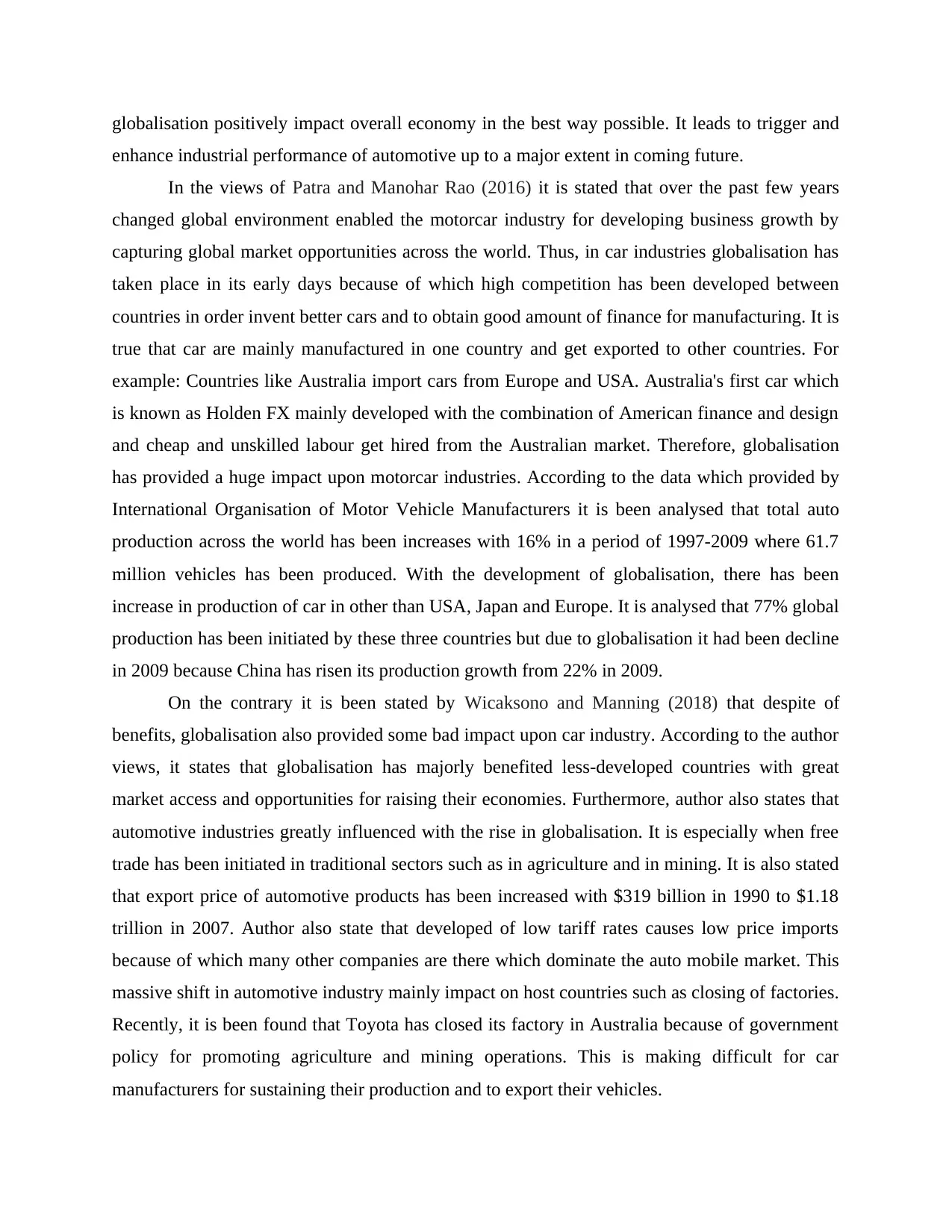
globalisation positively impact overall economy in the best way possible. It leads to trigger and
enhance industrial performance of automotive up to a major extent in coming future.
In the views of Patra and Manohar Rao (2016) it is stated that over the past few years
changed global environment enabled the motorcar industry for developing business growth by
capturing global market opportunities across the world. Thus, in car industries globalisation has
taken place in its early days because of which high competition has been developed between
countries in order invent better cars and to obtain good amount of finance for manufacturing. It is
true that car are mainly manufactured in one country and get exported to other countries. For
example: Countries like Australia import cars from Europe and USA. Australia's first car which
is known as Holden FX mainly developed with the combination of American finance and design
and cheap and unskilled labour get hired from the Australian market. Therefore, globalisation
has provided a huge impact upon motorcar industries. According to the data which provided by
International Organisation of Motor Vehicle Manufacturers it is been analysed that total auto
production across the world has been increases with 16% in a period of 1997-2009 where 61.7
million vehicles has been produced. With the development of globalisation, there has been
increase in production of car in other than USA, Japan and Europe. It is analysed that 77% global
production has been initiated by these three countries but due to globalisation it had been decline
in 2009 because China has risen its production growth from 22% in 2009.
On the contrary it is been stated by Wicaksono and Manning (2018) that despite of
benefits, globalisation also provided some bad impact upon car industry. According to the author
views, it states that globalisation has majorly benefited less-developed countries with great
market access and opportunities for raising their economies. Furthermore, author also states that
automotive industries greatly influenced with the rise in globalisation. It is especially when free
trade has been initiated in traditional sectors such as in agriculture and in mining. It is also stated
that export price of automotive products has been increased with $319 billion in 1990 to $1.18
trillion in 2007. Author also state that developed of low tariff rates causes low price imports
because of which many other companies are there which dominate the auto mobile market. This
massive shift in automotive industry mainly impact on host countries such as closing of factories.
Recently, it is been found that Toyota has closed its factory in Australia because of government
policy for promoting agriculture and mining operations. This is making difficult for car
manufacturers for sustaining their production and to export their vehicles.
enhance industrial performance of automotive up to a major extent in coming future.
In the views of Patra and Manohar Rao (2016) it is stated that over the past few years
changed global environment enabled the motorcar industry for developing business growth by
capturing global market opportunities across the world. Thus, in car industries globalisation has
taken place in its early days because of which high competition has been developed between
countries in order invent better cars and to obtain good amount of finance for manufacturing. It is
true that car are mainly manufactured in one country and get exported to other countries. For
example: Countries like Australia import cars from Europe and USA. Australia's first car which
is known as Holden FX mainly developed with the combination of American finance and design
and cheap and unskilled labour get hired from the Australian market. Therefore, globalisation
has provided a huge impact upon motorcar industries. According to the data which provided by
International Organisation of Motor Vehicle Manufacturers it is been analysed that total auto
production across the world has been increases with 16% in a period of 1997-2009 where 61.7
million vehicles has been produced. With the development of globalisation, there has been
increase in production of car in other than USA, Japan and Europe. It is analysed that 77% global
production has been initiated by these three countries but due to globalisation it had been decline
in 2009 because China has risen its production growth from 22% in 2009.
On the contrary it is been stated by Wicaksono and Manning (2018) that despite of
benefits, globalisation also provided some bad impact upon car industry. According to the author
views, it states that globalisation has majorly benefited less-developed countries with great
market access and opportunities for raising their economies. Furthermore, author also states that
automotive industries greatly influenced with the rise in globalisation. It is especially when free
trade has been initiated in traditional sectors such as in agriculture and in mining. It is also stated
that export price of automotive products has been increased with $319 billion in 1990 to $1.18
trillion in 2007. Author also state that developed of low tariff rates causes low price imports
because of which many other companies are there which dominate the auto mobile market. This
massive shift in automotive industry mainly impact on host countries such as closing of factories.
Recently, it is been found that Toyota has closed its factory in Australia because of government
policy for promoting agriculture and mining operations. This is making difficult for car
manufacturers for sustaining their production and to export their vehicles.
⊘ This is a preview!⊘
Do you want full access?
Subscribe today to unlock all pages.

Trusted by 1+ million students worldwide
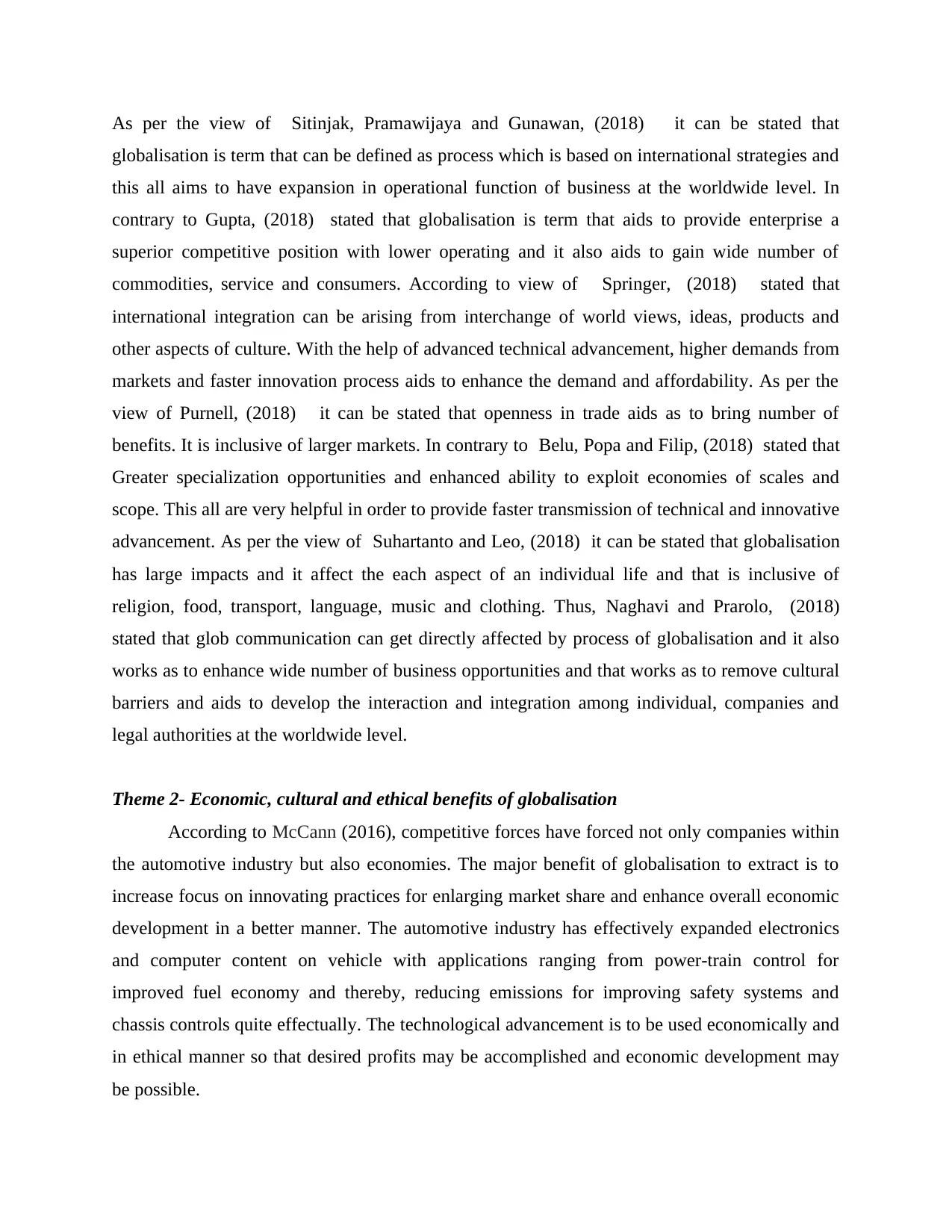
As per the view of Sitinjak, Pramawijaya and Gunawan, (2018) it can be stated that
globalisation is term that can be defined as process which is based on international strategies and
this all aims to have expansion in operational function of business at the worldwide level. In
contrary to Gupta, (2018) stated that globalisation is term that aids to provide enterprise a
superior competitive position with lower operating and it also aids to gain wide number of
commodities, service and consumers. According to view of Springer, (2018) stated that
international integration can be arising from interchange of world views, ideas, products and
other aspects of culture. With the help of advanced technical advancement, higher demands from
markets and faster innovation process aids to enhance the demand and affordability. As per the
view of Purnell, (2018) it can be stated that openness in trade aids as to bring number of
benefits. It is inclusive of larger markets. In contrary to Belu, Popa and Filip, (2018) stated that
Greater specialization opportunities and enhanced ability to exploit economies of scales and
scope. This all are very helpful in order to provide faster transmission of technical and innovative
advancement. As per the view of Suhartanto and Leo, (2018) it can be stated that globalisation
has large impacts and it affect the each aspect of an individual life and that is inclusive of
religion, food, transport, language, music and clothing. Thus, Naghavi and Prarolo, (2018)
stated that glob communication can get directly affected by process of globalisation and it also
works as to enhance wide number of business opportunities and that works as to remove cultural
barriers and aids to develop the interaction and integration among individual, companies and
legal authorities at the worldwide level.
Theme 2- Economic, cultural and ethical benefits of globalisation
According to McCann (2016), competitive forces have forced not only companies within
the automotive industry but also economies. The major benefit of globalisation to extract is to
increase focus on innovating practices for enlarging market share and enhance overall economic
development in a better manner. The automotive industry has effectively expanded electronics
and computer content on vehicle with applications ranging from power-train control for
improved fuel economy and thereby, reducing emissions for improving safety systems and
chassis controls quite effectually. The technological advancement is to be used economically and
in ethical manner so that desired profits may be accomplished and economic development may
be possible.
globalisation is term that can be defined as process which is based on international strategies and
this all aims to have expansion in operational function of business at the worldwide level. In
contrary to Gupta, (2018) stated that globalisation is term that aids to provide enterprise a
superior competitive position with lower operating and it also aids to gain wide number of
commodities, service and consumers. According to view of Springer, (2018) stated that
international integration can be arising from interchange of world views, ideas, products and
other aspects of culture. With the help of advanced technical advancement, higher demands from
markets and faster innovation process aids to enhance the demand and affordability. As per the
view of Purnell, (2018) it can be stated that openness in trade aids as to bring number of
benefits. It is inclusive of larger markets. In contrary to Belu, Popa and Filip, (2018) stated that
Greater specialization opportunities and enhanced ability to exploit economies of scales and
scope. This all are very helpful in order to provide faster transmission of technical and innovative
advancement. As per the view of Suhartanto and Leo, (2018) it can be stated that globalisation
has large impacts and it affect the each aspect of an individual life and that is inclusive of
religion, food, transport, language, music and clothing. Thus, Naghavi and Prarolo, (2018)
stated that glob communication can get directly affected by process of globalisation and it also
works as to enhance wide number of business opportunities and that works as to remove cultural
barriers and aids to develop the interaction and integration among individual, companies and
legal authorities at the worldwide level.
Theme 2- Economic, cultural and ethical benefits of globalisation
According to McCann (2016), competitive forces have forced not only companies within
the automotive industry but also economies. The major benefit of globalisation to extract is to
increase focus on innovating practices for enlarging market share and enhance overall economic
development in a better manner. The automotive industry has effectively expanded electronics
and computer content on vehicle with applications ranging from power-train control for
improved fuel economy and thereby, reducing emissions for improving safety systems and
chassis controls quite effectually. The technological advancement is to be used economically and
in ethical manner so that desired profits may be accomplished and economic development may
be possible.
Paraphrase This Document
Need a fresh take? Get an instant paraphrase of this document with our AI Paraphraser
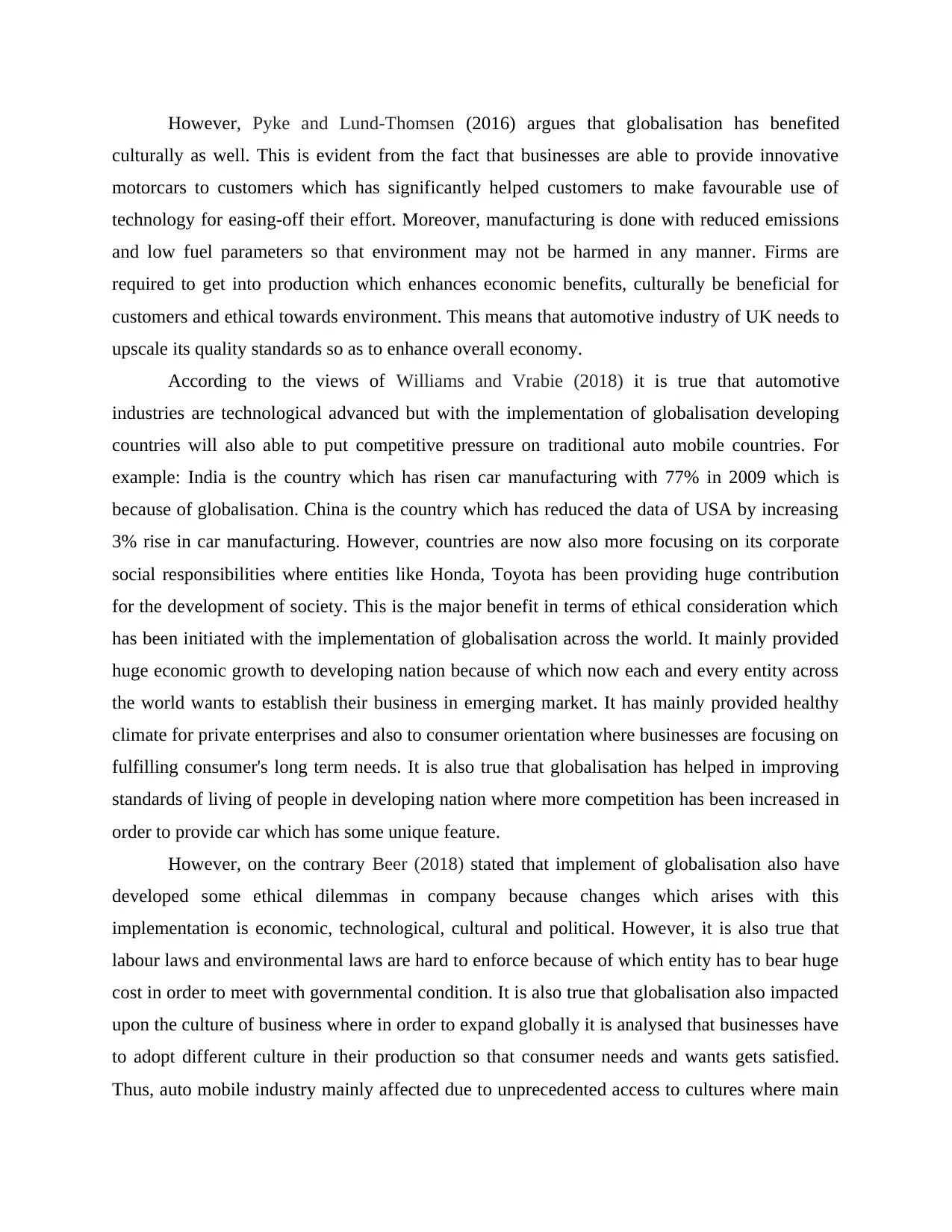
However, Pyke and Lund-Thomsen (2016) argues that globalisation has benefited
culturally as well. This is evident from the fact that businesses are able to provide innovative
motorcars to customers which has significantly helped customers to make favourable use of
technology for easing-off their effort. Moreover, manufacturing is done with reduced emissions
and low fuel parameters so that environment may not be harmed in any manner. Firms are
required to get into production which enhances economic benefits, culturally be beneficial for
customers and ethical towards environment. This means that automotive industry of UK needs to
upscale its quality standards so as to enhance overall economy.
According to the views of Williams and Vrabie (2018) it is true that automotive
industries are technological advanced but with the implementation of globalisation developing
countries will also able to put competitive pressure on traditional auto mobile countries. For
example: India is the country which has risen car manufacturing with 77% in 2009 which is
because of globalisation. China is the country which has reduced the data of USA by increasing
3% rise in car manufacturing. However, countries are now also more focusing on its corporate
social responsibilities where entities like Honda, Toyota has been providing huge contribution
for the development of society. This is the major benefit in terms of ethical consideration which
has been initiated with the implementation of globalisation across the world. It mainly provided
huge economic growth to developing nation because of which now each and every entity across
the world wants to establish their business in emerging market. It has mainly provided healthy
climate for private enterprises and also to consumer orientation where businesses are focusing on
fulfilling consumer's long term needs. It is also true that globalisation has helped in improving
standards of living of people in developing nation where more competition has been increased in
order to provide car which has some unique feature.
However, on the contrary Beer (2018) stated that implement of globalisation also have
developed some ethical dilemmas in company because changes which arises with this
implementation is economic, technological, cultural and political. However, it is also true that
labour laws and environmental laws are hard to enforce because of which entity has to bear huge
cost in order to meet with governmental condition. It is also true that globalisation also impacted
upon the culture of business where in order to expand globally it is analysed that businesses have
to adopt different culture in their production so that consumer needs and wants gets satisfied.
Thus, auto mobile industry mainly affected due to unprecedented access to cultures where main
culturally as well. This is evident from the fact that businesses are able to provide innovative
motorcars to customers which has significantly helped customers to make favourable use of
technology for easing-off their effort. Moreover, manufacturing is done with reduced emissions
and low fuel parameters so that environment may not be harmed in any manner. Firms are
required to get into production which enhances economic benefits, culturally be beneficial for
customers and ethical towards environment. This means that automotive industry of UK needs to
upscale its quality standards so as to enhance overall economy.
According to the views of Williams and Vrabie (2018) it is true that automotive
industries are technological advanced but with the implementation of globalisation developing
countries will also able to put competitive pressure on traditional auto mobile countries. For
example: India is the country which has risen car manufacturing with 77% in 2009 which is
because of globalisation. China is the country which has reduced the data of USA by increasing
3% rise in car manufacturing. However, countries are now also more focusing on its corporate
social responsibilities where entities like Honda, Toyota has been providing huge contribution
for the development of society. This is the major benefit in terms of ethical consideration which
has been initiated with the implementation of globalisation across the world. It mainly provided
huge economic growth to developing nation because of which now each and every entity across
the world wants to establish their business in emerging market. It has mainly provided healthy
climate for private enterprises and also to consumer orientation where businesses are focusing on
fulfilling consumer's long term needs. It is also true that globalisation has helped in improving
standards of living of people in developing nation where more competition has been increased in
order to provide car which has some unique feature.
However, on the contrary Beer (2018) stated that implement of globalisation also have
developed some ethical dilemmas in company because changes which arises with this
implementation is economic, technological, cultural and political. However, it is also true that
labour laws and environmental laws are hard to enforce because of which entity has to bear huge
cost in order to meet with governmental condition. It is also true that globalisation also impacted
upon the culture of business where in order to expand globally it is analysed that businesses have
to adopt different culture in their production so that consumer needs and wants gets satisfied.
Thus, auto mobile industry mainly affected due to unprecedented access to cultures where main
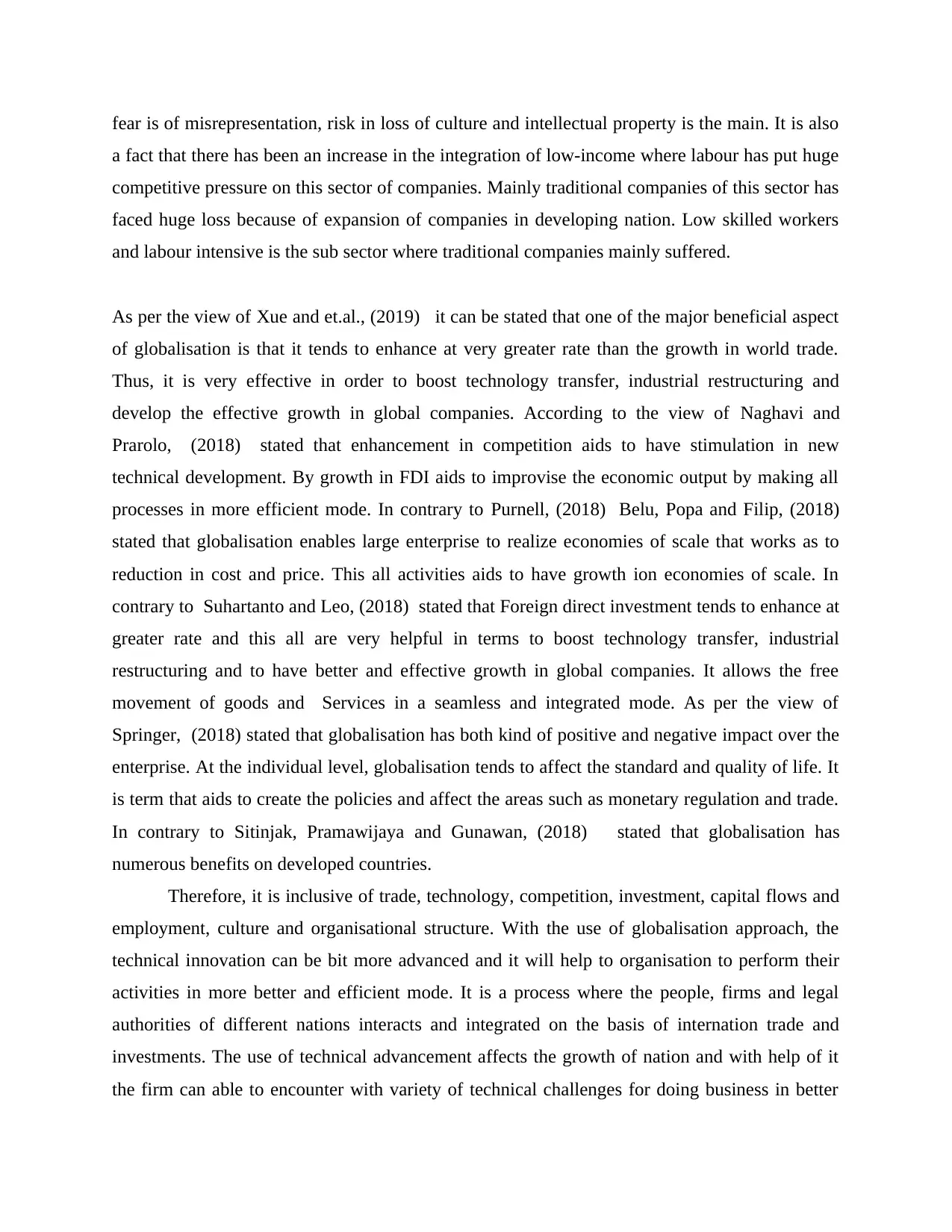
fear is of misrepresentation, risk in loss of culture and intellectual property is the main. It is also
a fact that there has been an increase in the integration of low-income where labour has put huge
competitive pressure on this sector of companies. Mainly traditional companies of this sector has
faced huge loss because of expansion of companies in developing nation. Low skilled workers
and labour intensive is the sub sector where traditional companies mainly suffered.
As per the view of Xue and et.al., (2019) it can be stated that one of the major beneficial aspect
of globalisation is that it tends to enhance at very greater rate than the growth in world trade.
Thus, it is very effective in order to boost technology transfer, industrial restructuring and
develop the effective growth in global companies. According to the view of Naghavi and
Prarolo, (2018) stated that enhancement in competition aids to have stimulation in new
technical development. By growth in FDI aids to improvise the economic output by making all
processes in more efficient mode. In contrary to Purnell, (2018) Belu, Popa and Filip, (2018)
stated that globalisation enables large enterprise to realize economies of scale that works as to
reduction in cost and price. This all activities aids to have growth ion economies of scale. In
contrary to Suhartanto and Leo, (2018) stated that Foreign direct investment tends to enhance at
greater rate and this all are very helpful in terms to boost technology transfer, industrial
restructuring and to have better and effective growth in global companies. It allows the free
movement of goods and Services in a seamless and integrated mode. As per the view of
Springer, (2018) stated that globalisation has both kind of positive and negative impact over the
enterprise. At the individual level, globalisation tends to affect the standard and quality of life. It
is term that aids to create the policies and affect the areas such as monetary regulation and trade.
In contrary to Sitinjak, Pramawijaya and Gunawan, (2018) stated that globalisation has
numerous benefits on developed countries.
Therefore, it is inclusive of trade, technology, competition, investment, capital flows and
employment, culture and organisational structure. With the use of globalisation approach, the
technical innovation can be bit more advanced and it will help to organisation to perform their
activities in more better and efficient mode. It is a process where the people, firms and legal
authorities of different nations interacts and integrated on the basis of internation trade and
investments. The use of technical advancement affects the growth of nation and with help of it
the firm can able to encounter with variety of technical challenges for doing business in better
a fact that there has been an increase in the integration of low-income where labour has put huge
competitive pressure on this sector of companies. Mainly traditional companies of this sector has
faced huge loss because of expansion of companies in developing nation. Low skilled workers
and labour intensive is the sub sector where traditional companies mainly suffered.
As per the view of Xue and et.al., (2019) it can be stated that one of the major beneficial aspect
of globalisation is that it tends to enhance at very greater rate than the growth in world trade.
Thus, it is very effective in order to boost technology transfer, industrial restructuring and
develop the effective growth in global companies. According to the view of Naghavi and
Prarolo, (2018) stated that enhancement in competition aids to have stimulation in new
technical development. By growth in FDI aids to improvise the economic output by making all
processes in more efficient mode. In contrary to Purnell, (2018) Belu, Popa and Filip, (2018)
stated that globalisation enables large enterprise to realize economies of scale that works as to
reduction in cost and price. This all activities aids to have growth ion economies of scale. In
contrary to Suhartanto and Leo, (2018) stated that Foreign direct investment tends to enhance at
greater rate and this all are very helpful in terms to boost technology transfer, industrial
restructuring and to have better and effective growth in global companies. It allows the free
movement of goods and Services in a seamless and integrated mode. As per the view of
Springer, (2018) stated that globalisation has both kind of positive and negative impact over the
enterprise. At the individual level, globalisation tends to affect the standard and quality of life. It
is term that aids to create the policies and affect the areas such as monetary regulation and trade.
In contrary to Sitinjak, Pramawijaya and Gunawan, (2018) stated that globalisation has
numerous benefits on developed countries.
Therefore, it is inclusive of trade, technology, competition, investment, capital flows and
employment, culture and organisational structure. With the use of globalisation approach, the
technical innovation can be bit more advanced and it will help to organisation to perform their
activities in more better and efficient mode. It is a process where the people, firms and legal
authorities of different nations interacts and integrated on the basis of internation trade and
investments. The use of technical advancement affects the growth of nation and with help of it
the firm can able to encounter with variety of technical challenges for doing business in better
⊘ This is a preview!⊘
Do you want full access?
Subscribe today to unlock all pages.

Trusted by 1+ million students worldwide
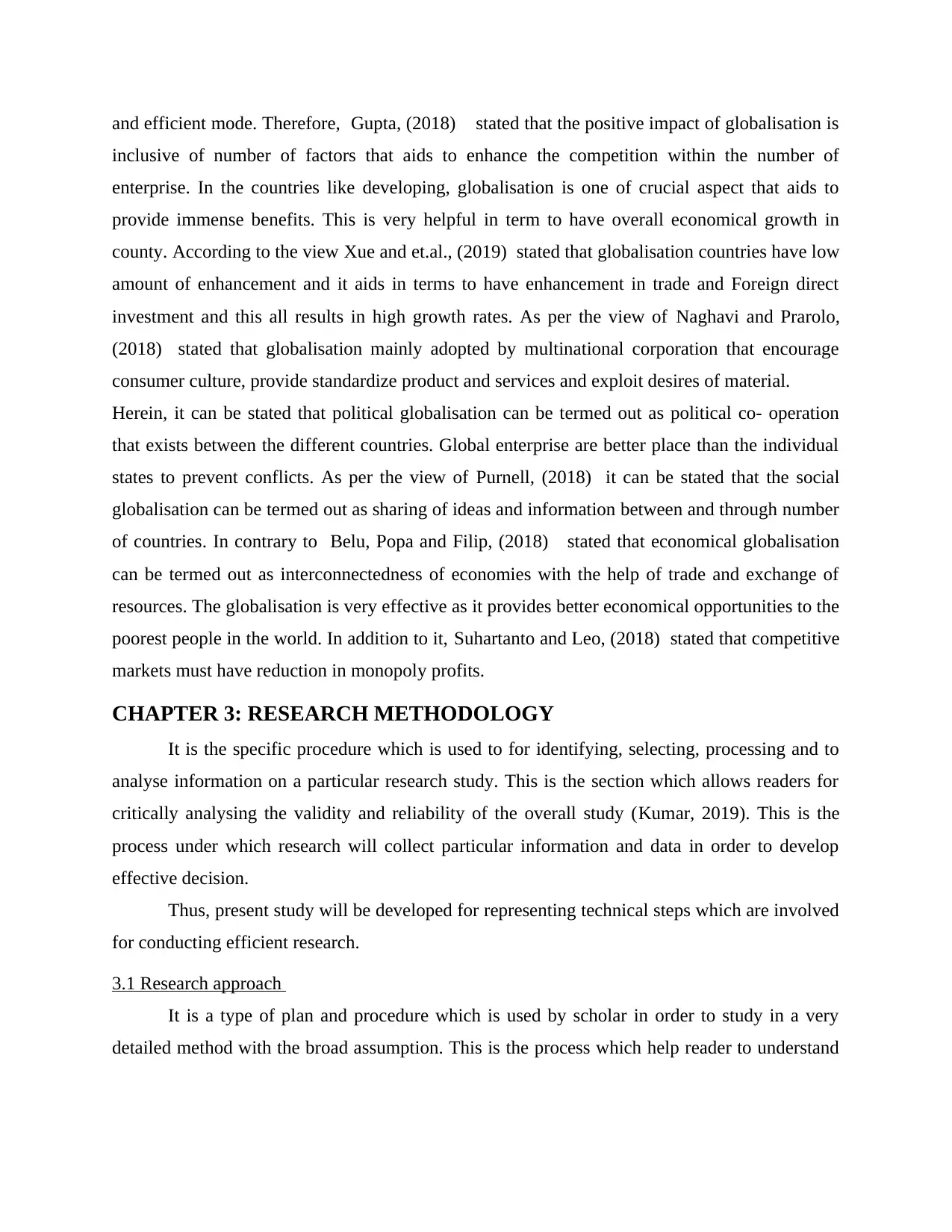
and efficient mode. Therefore, Gupta, (2018) stated that the positive impact of globalisation is
inclusive of number of factors that aids to enhance the competition within the number of
enterprise. In the countries like developing, globalisation is one of crucial aspect that aids to
provide immense benefits. This is very helpful in term to have overall economical growth in
county. According to the view Xue and et.al., (2019) stated that globalisation countries have low
amount of enhancement and it aids in terms to have enhancement in trade and Foreign direct
investment and this all results in high growth rates. As per the view of Naghavi and Prarolo,
(2018) stated that globalisation mainly adopted by multinational corporation that encourage
consumer culture, provide standardize product and services and exploit desires of material.
Herein, it can be stated that political globalisation can be termed out as political co- operation
that exists between the different countries. Global enterprise are better place than the individual
states to prevent conflicts. As per the view of Purnell, (2018) it can be stated that the social
globalisation can be termed out as sharing of ideas and information between and through number
of countries. In contrary to Belu, Popa and Filip, (2018) stated that economical globalisation
can be termed out as interconnectedness of economies with the help of trade and exchange of
resources. The globalisation is very effective as it provides better economical opportunities to the
poorest people in the world. In addition to it, Suhartanto and Leo, (2018) stated that competitive
markets must have reduction in monopoly profits.
CHAPTER 3: RESEARCH METHODOLOGY
It is the specific procedure which is used to for identifying, selecting, processing and to
analyse information on a particular research study. This is the section which allows readers for
critically analysing the validity and reliability of the overall study (Kumar, 2019). This is the
process under which research will collect particular information and data in order to develop
effective decision.
Thus, present study will be developed for representing technical steps which are involved
for conducting efficient research.
3.1 Research approach
It is a type of plan and procedure which is used by scholar in order to study in a very
detailed method with the broad assumption. This is the process which help reader to understand
inclusive of number of factors that aids to enhance the competition within the number of
enterprise. In the countries like developing, globalisation is one of crucial aspect that aids to
provide immense benefits. This is very helpful in term to have overall economical growth in
county. According to the view Xue and et.al., (2019) stated that globalisation countries have low
amount of enhancement and it aids in terms to have enhancement in trade and Foreign direct
investment and this all results in high growth rates. As per the view of Naghavi and Prarolo,
(2018) stated that globalisation mainly adopted by multinational corporation that encourage
consumer culture, provide standardize product and services and exploit desires of material.
Herein, it can be stated that political globalisation can be termed out as political co- operation
that exists between the different countries. Global enterprise are better place than the individual
states to prevent conflicts. As per the view of Purnell, (2018) it can be stated that the social
globalisation can be termed out as sharing of ideas and information between and through number
of countries. In contrary to Belu, Popa and Filip, (2018) stated that economical globalisation
can be termed out as interconnectedness of economies with the help of trade and exchange of
resources. The globalisation is very effective as it provides better economical opportunities to the
poorest people in the world. In addition to it, Suhartanto and Leo, (2018) stated that competitive
markets must have reduction in monopoly profits.
CHAPTER 3: RESEARCH METHODOLOGY
It is the specific procedure which is used to for identifying, selecting, processing and to
analyse information on a particular research study. This is the section which allows readers for
critically analysing the validity and reliability of the overall study (Kumar, 2019). This is the
process under which research will collect particular information and data in order to develop
effective decision.
Thus, present study will be developed for representing technical steps which are involved
for conducting efficient research.
3.1 Research approach
It is a type of plan and procedure which is used by scholar in order to study in a very
detailed method with the broad assumption. This is the process which help reader to understand
Paraphrase This Document
Need a fresh take? Get an instant paraphrase of this document with our AI Paraphraser
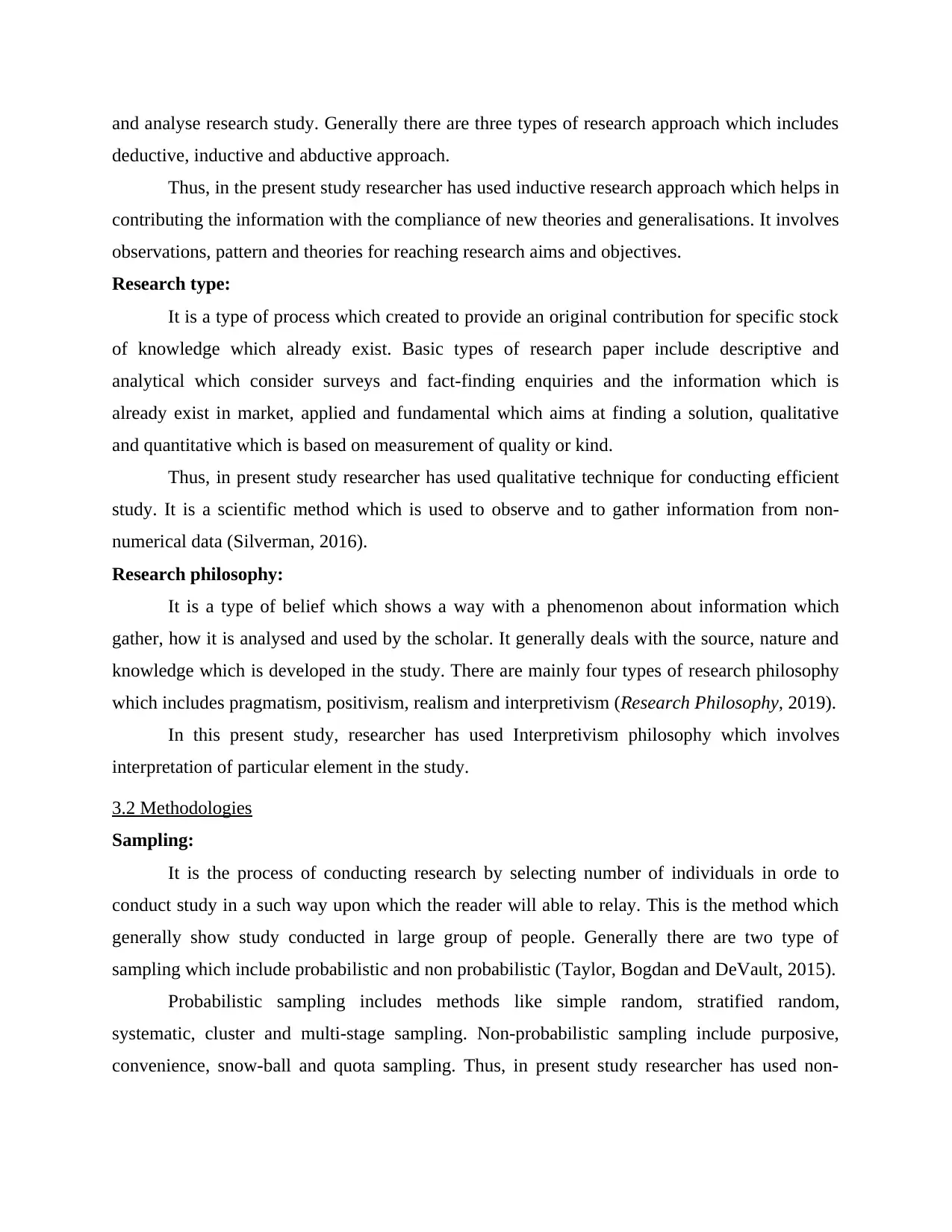
and analyse research study. Generally there are three types of research approach which includes
deductive, inductive and abductive approach.
Thus, in the present study researcher has used inductive research approach which helps in
contributing the information with the compliance of new theories and generalisations. It involves
observations, pattern and theories for reaching research aims and objectives.
Research type:
It is a type of process which created to provide an original contribution for specific stock
of knowledge which already exist. Basic types of research paper include descriptive and
analytical which consider surveys and fact-finding enquiries and the information which is
already exist in market, applied and fundamental which aims at finding a solution, qualitative
and quantitative which is based on measurement of quality or kind.
Thus, in present study researcher has used qualitative technique for conducting efficient
study. It is a scientific method which is used to observe and to gather information from non-
numerical data (Silverman, 2016).
Research philosophy:
It is a type of belief which shows a way with a phenomenon about information which
gather, how it is analysed and used by the scholar. It generally deals with the source, nature and
knowledge which is developed in the study. There are mainly four types of research philosophy
which includes pragmatism, positivism, realism and interpretivism (Research Philosophy, 2019).
In this present study, researcher has used Interpretivism philosophy which involves
interpretation of particular element in the study.
3.2 Methodologies
Sampling:
It is the process of conducting research by selecting number of individuals in orde to
conduct study in a such way upon which the reader will able to relay. This is the method which
generally show study conducted in large group of people. Generally there are two type of
sampling which include probabilistic and non probabilistic (Taylor, Bogdan and DeVault, 2015).
Probabilistic sampling includes methods like simple random, stratified random,
systematic, cluster and multi-stage sampling. Non-probabilistic sampling include purposive,
convenience, snow-ball and quota sampling. Thus, in present study researcher has used non-
deductive, inductive and abductive approach.
Thus, in the present study researcher has used inductive research approach which helps in
contributing the information with the compliance of new theories and generalisations. It involves
observations, pattern and theories for reaching research aims and objectives.
Research type:
It is a type of process which created to provide an original contribution for specific stock
of knowledge which already exist. Basic types of research paper include descriptive and
analytical which consider surveys and fact-finding enquiries and the information which is
already exist in market, applied and fundamental which aims at finding a solution, qualitative
and quantitative which is based on measurement of quality or kind.
Thus, in present study researcher has used qualitative technique for conducting efficient
study. It is a scientific method which is used to observe and to gather information from non-
numerical data (Silverman, 2016).
Research philosophy:
It is a type of belief which shows a way with a phenomenon about information which
gather, how it is analysed and used by the scholar. It generally deals with the source, nature and
knowledge which is developed in the study. There are mainly four types of research philosophy
which includes pragmatism, positivism, realism and interpretivism (Research Philosophy, 2019).
In this present study, researcher has used Interpretivism philosophy which involves
interpretation of particular element in the study.
3.2 Methodologies
Sampling:
It is the process of conducting research by selecting number of individuals in orde to
conduct study in a such way upon which the reader will able to relay. This is the method which
generally show study conducted in large group of people. Generally there are two type of
sampling which include probabilistic and non probabilistic (Taylor, Bogdan and DeVault, 2015).
Probabilistic sampling includes methods like simple random, stratified random,
systematic, cluster and multi-stage sampling. Non-probabilistic sampling include purposive,
convenience, snow-ball and quota sampling. Thus, in present study researcher has used non-
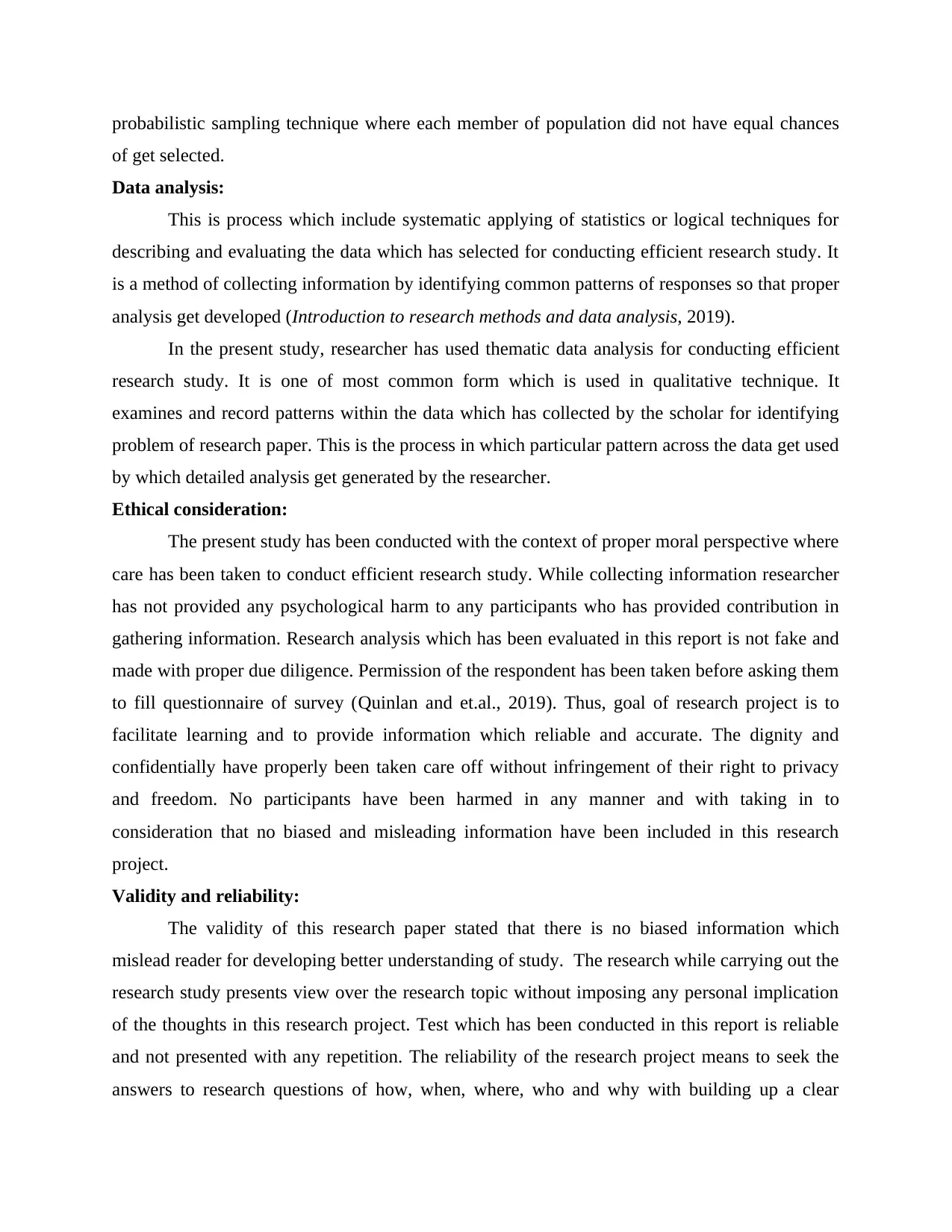
probabilistic sampling technique where each member of population did not have equal chances
of get selected.
Data analysis:
This is process which include systematic applying of statistics or logical techniques for
describing and evaluating the data which has selected for conducting efficient research study. It
is a method of collecting information by identifying common patterns of responses so that proper
analysis get developed (Introduction to research methods and data analysis, 2019).
In the present study, researcher has used thematic data analysis for conducting efficient
research study. It is one of most common form which is used in qualitative technique. It
examines and record patterns within the data which has collected by the scholar for identifying
problem of research paper. This is the process in which particular pattern across the data get used
by which detailed analysis get generated by the researcher.
Ethical consideration:
The present study has been conducted with the context of proper moral perspective where
care has been taken to conduct efficient research study. While collecting information researcher
has not provided any psychological harm to any participants who has provided contribution in
gathering information. Research analysis which has been evaluated in this report is not fake and
made with proper due diligence. Permission of the respondent has been taken before asking them
to fill questionnaire of survey (Quinlan and et.al., 2019). Thus, goal of research project is to
facilitate learning and to provide information which reliable and accurate. The dignity and
confidentially have properly been taken care off without infringement of their right to privacy
and freedom. No participants have been harmed in any manner and with taking in to
consideration that no biased and misleading information have been included in this research
project.
Validity and reliability:
The validity of this research paper stated that there is no biased information which
mislead reader for developing better understanding of study. The research while carrying out the
research study presents view over the research topic without imposing any personal implication
of the thoughts in this research project. Test which has been conducted in this report is reliable
and not presented with any repetition. The reliability of the research project means to seek the
answers to research questions of how, when, where, who and why with building up a clear
of get selected.
Data analysis:
This is process which include systematic applying of statistics or logical techniques for
describing and evaluating the data which has selected for conducting efficient research study. It
is a method of collecting information by identifying common patterns of responses so that proper
analysis get developed (Introduction to research methods and data analysis, 2019).
In the present study, researcher has used thematic data analysis for conducting efficient
research study. It is one of most common form which is used in qualitative technique. It
examines and record patterns within the data which has collected by the scholar for identifying
problem of research paper. This is the process in which particular pattern across the data get used
by which detailed analysis get generated by the researcher.
Ethical consideration:
The present study has been conducted with the context of proper moral perspective where
care has been taken to conduct efficient research study. While collecting information researcher
has not provided any psychological harm to any participants who has provided contribution in
gathering information. Research analysis which has been evaluated in this report is not fake and
made with proper due diligence. Permission of the respondent has been taken before asking them
to fill questionnaire of survey (Quinlan and et.al., 2019). Thus, goal of research project is to
facilitate learning and to provide information which reliable and accurate. The dignity and
confidentially have properly been taken care off without infringement of their right to privacy
and freedom. No participants have been harmed in any manner and with taking in to
consideration that no biased and misleading information have been included in this research
project.
Validity and reliability:
The validity of this research paper stated that there is no biased information which
mislead reader for developing better understanding of study. The research while carrying out the
research study presents view over the research topic without imposing any personal implication
of the thoughts in this research project. Test which has been conducted in this report is reliable
and not presented with any repetition. The reliability of the research project means to seek the
answers to research questions of how, when, where, who and why with building up a clear
⊘ This is a preview!⊘
Do you want full access?
Subscribe today to unlock all pages.

Trusted by 1+ million students worldwide
1 out of 32
Related Documents
Your All-in-One AI-Powered Toolkit for Academic Success.
+13062052269
info@desklib.com
Available 24*7 on WhatsApp / Email
![[object Object]](/_next/static/media/star-bottom.7253800d.svg)
Unlock your academic potential
Copyright © 2020–2026 A2Z Services. All Rights Reserved. Developed and managed by ZUCOL.




